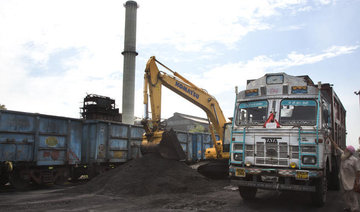UNCHA AMIRPUR: Subedar Singh bears the scars of India’s painful reliance on dirty power and its struggle to pay for the costly transition to the brave new world of solar and renewable electricity.
Last year, the farmer walked into a field in his village and suffered 70 percent burns to his feet and ankles from an underground coal fire caused by a nearby power plant. Singh said he dragged himself out of the field and then fainted from the searing pain.
The people of Uncha Amirpur in the northern Uttar Pradesh state — east of the smog-afflicted capital New Delhi — discovered that a mix of water and coal used by the nearby NTPC Dadri power plant had accumulated under the field and caught fire. Some cattle died.
Hundreds of millions of people in India are forced to live with the fallout of the dirtiest fuels — with the government blaming a lack of funds to pay for greener power.
Money will be the key issue when about 100 countries meet in Paris on Tuesday for the One Planet Summit organized by French President Emmanuel Macron. The meeting will focus on marshalling public and private funds to speed the move to a low-carbon economy.
Developing countries say barely a tenth of the $100 billion (SR375 billion) promised by the end of the decade under a 2010 deal has come in so far.
“If more money is available, of course the (Indian) government is in a position to push renewable energy faster,” energy analyst Narendra Taneja said.
“The pollutants accumulated over the decades, we didn’t do that. It was the West and they should clear up those dues as soon as possible,” said Taneja, a consultant to the ruling Bharatiya Janata Party.
India needs $140 billion to reach Prime Minister Narendra Modi’s ambitious target of installing 100,000 megawatts of solar power by 2022, according to Arunabha Ghosh, chief executive of the Council on Energy, Environment and Water, a New Delhi think tank.
So far it has just 15,000 MW, less than five percent of the country’s total generation capacity of 331,000 MW.
Developing countries “have stayed committed to the Paris agreement, even after the US decision to exit, but their ability to scale up ambitions is contingent on how much rich countries do at home and how much they support actions outside,” Ghosh said.
“Next year could be a tipping point for their patience.”
As one of the fastest growing major economies, India needs uninterrupted power to keep factories humming and the economy expanding.
Currently, 66 percent of its electricity is generated by coal and gas. The rest comes from nuclear and renewables, including hydro, wind and solar.
India needs renewable energy to meet its 2015 Paris commitment to reduce emissions relative to gross domestic product by up to 35 percent by 2030 from 2005 levels.
A lack of affordable options to store wind and solar energy means cheap coal is India’s mainstay. More than 300 coal power plant units missed a December 7 government deadline to upgrade with emissions reduction technology.
The impact is visible in Uncha Amirpur, where a thick coat of grime and dust covers every surface.
The Dadri power plant provides up to one third of the electricity required for New Delhi, 66 kilometers away by road, but also fuels the smog that envelops the Indian capital each winter.
The severe air pollution in New Delhi — many times the global safe limit — has been linked to asthma, bronchitis and even brain disease in babies.
Mandeep Raghav, a village local trying out for the Uttar Pradesh state cricket team, said there are days when he finds it hard to breathe.
“When I run, it’s okay for a while as I absorb the pollution, but at night when I sleep, I can feel my heartbeat increasing,” the 23-year-old batsman, whose father died of asthma in April, said.
“Sometimes I feel like I’m about to die.”
Ishwar Chand Sharma, who earns about 7,000 rupees a month as a mechanic at the coal plant, said: “For most of this year, I’ve been sick at least 10 days a month and missed work.”
Ash from the coal plant spreads to nearby villages, including Salarpur Kala, which is sandwiched between the plant and two cement factories.
Satbir Singh, a retired soldier who took up farming, said the ash ruins his crops.
“There’s a thick layer on the buds that just kills the wheat,” he said. “At least half of the 200 acres here was wiped out in October.”
Pollution conundrum: India faces painful move to cleaner energy
Pollution conundrum: India faces painful move to cleaner energy

Saudi maritime industry spurring global trade shift

- Saudi Arabia advancing its shipbuilding and maritime technology through strategic partnerships
JEDDAH: Saudi Arabia’s investment in its maritime sector could see a shift in global trade logistics that helps reduce reliance on traditional routes, leading industry figures have told Arab News.
With its strategic location at the crossroads of global trade, the Kingdom is positioning itself as an international logistics hub, enhancing its maritime infrastructure and embracing sustainability.
This drive is a key part of Saudi Arabia’s economic diversification initiative under Vision 2030, which seeks to reduce the Kingdom’s reliance on oil revenues.
In August, Omar Hariri, president of the Saudi Ports Authority, revealed that investments in the Kingdom’s maritime sector have exceeded SR25 billion ($6.66 billion) thanks to successful collaborations between his organization and private sector partners.
Hariri said that significant investments have been made over the past four years through partnerships with both national and international companies.
Speaking to Arab News, Pierroberto Folgiero, CEO of Fincantieri, one of the world’s largest shipbuilding companies, highlighted how Saudi Arabia’s investment in maritime infrastructure is influencing the future of global trade routes.
“By expanding its shipbuilding capacity and enhancing its logistics infrastructure, the Kingdom can address global supply chain bottlenecks, strengthen its maritime influence, and foster resilience in international trade flows,” he said.
Folgiero noted that Saudi investments in advanced maritime infrastructure could create alternative trade routes, reducing reliance on chokepoints like the Suez Canal, adding that his company sees this as an opportunity to apply its shipbuilding and maritime technology expertise.
“Investments in shipbuilding, ports, logistics, and shipping services have allowed the Kingdom to capitalize on its geographic advantages. Notable projects include the development of the King Salman International Maritime Industries Complex in Ras Al-Khair, set to become one of the world’s largest shipyards, and modernizing key ports such as the Jeddah Islamic Port and King Abdulaziz Port,” he said.
The CEO added that Saudi Arabia is also advancing its shipbuilding and maritime technology through strategic partnerships with global industry leaders.

We are leveraging the adoption of digitization, automation, and AI-driven solutions to optimize port operations and streamline the logistics chain.
Poul Hestbaek, Folk Maritime CEO
“These collaborations focus on transferring expertise and technology, accelerating the Kingdom’s evolution into an influential player in the international maritime and shipping sectors,” he said.
He pointed out that Saudi Arabia’s focus on smart ports, using automation, IoT, and AI, is central to its maritime strategy. These technologies will streamline trade, improve turnaround times, reduce costs, and boost transparency, making the Kingdom an attractive hub for global shipping and logistics companies.
In May, Fincantieri launched Fincantieri Arabia, a subsidiary with a focus on shipbuilding, maritime equipment and systems, and naval logistic support services, including training and simulation.
Folgiero said this expansion will contribute to localizing technology, creating jobs, and boosting Saudi Arabia’s global maritime presence.
National developments
It is not just established international companies that will benefit from Saudi Arabia’s growing maritime sector.
In 2024, the Public Investment Fund-backed Folk Maritime was launched, initially operating two routes, but that number has since doubled.
Poul Hestbaek, the former CEO of Hamburg Sud, has been tasked to lead the company.
Speaking to Arab News, he highlighted the Saudi government’s proactive steps to adapt its regulatory framework and attract global investors to the industry, noting that his company is fully aligned with these efforts to drive innovation in maritime trade.
“As Saudi Arabia modernizes its regulatory framework, we are leveraging the adoption of digitization, automation, and AI-driven solutions to optimize port operations and streamline the logistics chain. This transformation is enhancing Saudi Arabia’s position as an attractive destination for international investors,” he said. Hestbaek said that his company is playing a vital role in this transformation, particularly through its expanding fleet and direct liner services along strategic routes, including those connecting India to the Red Sea and the Gulf.

He also highlighted Folk Maritime’s role in improving cargo efficiency across key trade routes, including the Red Sea and the Gulf.
“As we increase regional shipping capabilities and expand our fleet, key economic indicators to watch include the growth in port throughput, the development of new shipping routes, and the rise in non-oil exports,” said the CEO.
Sustainable maritime operations
Achieving growth in the sector is not the only goal for Saudi Arabia. As Hestbaek emphasized, expansion has to be done in a sustainable manner.
Explaining how sustainability is at the core of his company’s operations, he said: “We are aligned with Saudi Arabia’s net zero carbon by 2060 goals, incorporating advanced green technologies into our fleet, using energy-efficient technologies to reduce emissions and optimize fuel consumption.”
Hestbaek noted the Folk Maritime’s commitment to decarbonization by adhering to international standards, prioritizing International Maritime Organization regulations, adopting alternative fuels, and replacing older vessels with eco-friendly ones like the M/V Folk Jeddah. The company also recently purchased 5,600 recyclable containers.
Ensuring secure, resilient operations
As the Houthi-led attacks in the Red Sea have demonstrated, security is an ever-present concern for the maritime industry.
Hestbaek highlighted Saudi Arabia’s multi-faceted approach to ensuring secure shipping lanes, addressing both physical and cyberthreats.
“The Kingdom works closely with international and regional partners to counter piracy and maintain secure sea routes in the Arabian Gulf, Red Sea, and beyond. Saudi Arabia has invested in state-of-the-art naval and coast guard assets, as well as enhancing port security to safeguard ships and cargo,” he said.
The CEO added that his company has a strategy to safeguard operations and collaborates with local and international authorities, adding that cybersecurity is a top priority for both Saudi Arabia and Folk Maritime.
“We are committed to safeguarding our fleet and digital infrastructure from emerging cyberthreats, implementing cybersecurity measures, such as secure communication channels, real-time monitoring systems, and advanced protocols for data protection and cargo tracking,” he said.
Maritime tourism
The maritime industry is more than just transferring goods from port to port.
As Fincantieri’s Folgiero said, Saudi giga-projects such as NEOM and the Red Sea are transforming the Kingdom’s cruise ship industry, aligning with Vision 2030’s goal of making Saudi Arabia an international tourism hub.
“Futuristic cities like The Line and Sindalah Island, alongside the eco-tourism focus of the Red Sea Project, offer bespoke and sustainable experiences that cater to the high-end travel market, sharpening Saudi Arabia’s competitive edge in the global tourism landscape,” he said.
Ensuring the Kingdom capitalizes on this, the PIF-backed Cruise Saudi was created in 2021, with an aim to attract 1.3 million passengers annually by 2035.
It also plans to generate 50,000 direct and indirect jobs in the cruise sector by 2035.
Cruise Saudi’s first ship, Aroya, which features 19 decks, 1,678 cabins and suites, and can accommodate up to 3,362 passengers, was launched in December at Jeddah Islamic Port.
MENA startup sector ends Q1 with momentum

- Developments underscore region’s evolving startup landscape
RIYADH: The Middle East and North Africa’s startup ecosystem is ending the first quarter of 2025 with significant momentum, marked by high-value deals, strategic acquisitions, and international expansion plans across multiple industries.
From fintech innovation to food and beverage consolidation and media sector growth, these developments underscore the region’s evolving startup landscape and its increasing global influence.
Nayla Finance secures $4 million to transform SME lending in Saudi Arabia
Riyadh-based fintech startup Nayla Finance has raised $4 million in a seed funding round led by Sanabil Venture Studio by Stryber. The investment will support the company’s mission to address Saudi Arabia’s substantial small and medium-sized enterprises financing gap, estimated at $30 billion.
The funding includes $2.7 million allocated for micro-business debt financing.
Nayla Finance is deploying artificial intelligence and alternative data sources to develop credit scoring for small businesses, with particular emphasis on the food and beverage, e-commerce, and retail sectors.
The firm’s co-founder and CEO, Shaqran Alyahya, emphasized the company’s distinctive approach, saying: “We are building what others hesitate to — empowering important drivers of the Saudi economy with financial solutions designed for their reality.”
The startup’s digital-first platform eliminates traditional banking hurdles by offering streamlined applications, real-time risk assessment, and sector-specific financial products.

Nayla’s co-founder and chief risk officer, Khalid Naili, added: “By leveraging technology, alternative data, and advanced risk models, we are redefining creditworthiness and unlocking financing for businesses that drive the economy.”
The firm leverages data-driven credit evaluation and a fully digital platform to streamline financing access for small businesses, eliminating the bureaucratic hurdles associated with conventional banking systems.
Epik Foods acquires Sauce Capital in $15 million deal
UAE-based Epik Foods has made a strategic move to strengthen its position in the Gulf Cooperation Council’s food and beverage sector by acquiring Abu Dhabi’s Sauce Capital. The transaction was supported by $15 million in fresh funding from Ruya Private Capital. The acquisition creates one of MENA’s largest F&B operators, combining 75 brands under a single umbrella. It significantly enhances Epik’s presence in Saudi Arabia through Sauce Capital’s established operations in the Kingdom.
The expanded group now operates across 50 locations in the UAE, Saudi Arabia, and Oman, encompassing quick-service restaurants, digital food brands, meal kits, and catering services.
NKN Media secures $9.5 million for global growth
Dubai-based NKN Media has announced a significant funding milestone, having secured 35 million Emirati dirhams ($9.5 million) with plans to raise an additional 50 million dirhams.
This capital injection will fuel the company’s ambitious international expansion strategy, reflecting the growing influence of MENA-based media enterprises.
NKN Media is extending its successful Dubai Property Expo to leading global markets, including London, Turkiye, New York, and Moscow.
It is also launching several new intellectual properties, including the Ultimate Realty Awards in May, the third season of Icons of the UAE in September, and the Majlis Premium startup fundraising forum in October.

Growing at an excellent pace, our expansion reflects the demand for high-quality media experiences.
Abdul Majid Khan, Group CEO of NKN Media
Additionally, the company is expanding its presence in the inflight media sector, building on the success of its Spice Route magazine to capture premium travel audiences worldwide.
Group CEO of NKN Media, Abdul Majid Khan, said that the company was at a “defining moment in its journey.”
He added: “Growing at an excellent pace, our expansion reflects the demand for high-quality media experiences. With our recent success, we are not only scaling our flagship events but also venturing into new markets and media verticals.”
According to the CEO, the firm’s focus remains on “delivering impactful content and world-class events that drive business growth.”
He further noted that the next phase of NKN Media expansion would be about scale, innovation, and global reach.
The company benefits from partnerships with major networks, including India Today, Republic TV, and NDTV, along with operations in seven countries across the Middle East, Asia, and North America.
EHC Investment acquires Al-Fanar Gas Group
In a notable deal for the UAE’s energy sector, EHC Investment, through its energy arm Emirates International Gas, has completed the full acquisition of Al-Fanar Gas Group, Abu Dhabi’s largest gas distributor and maintenance provider. This strategic move significantly strengthens EHC’s position in the UAE’s evolving energy landscape.
The acquisition combines Al-Fanar Gas Group’s 30 years of market experience with EIG’s resources and vision, creating a powerhouse in gas distribution and infrastructure services.
Ali Al-Gebely, managing director and board member of EHC Investment, said: “This acquisition will allow us to strengthen that commitment while unlocking new avenues for growth and innovation.”
He added: “Together, we can utilize our combined capabilities to expand our reach and to pioneer next-generation solutions that meet the dynamic demands of our clients and contribute to the nation’s energy ambitions.”
The deal aligns with the UAE Energy Strategy’s goals of infrastructure modernization and operational efficiency enhancement.
Saudi Crown Prince issues directives to curb rising land prices and rents in Riyadh

- Decision followed study carried out by Royal Commission for Riyadh City and Council of Economic and Development Affairs
RIYADH: In response to the rising land prices and rental costs in Riyadh, Crown Prince Mohammed bin Salman on Saturday directed a series of measures aimed at achieving stability in the real estate sector, the Saudi Press Agency reported.
The decision followed a study carried out by the Royal Commission for Riyadh City and the Council of Economic and Development Affairs, which assessed the challenges facing the market in the Saudi capital.
A key aspect of the directive will be the lifting of restrictions on land transactions and development in northern Riyadh.
The move will allow for the sale, purchase, division, and subdivision of land in designated areas, as well as the issuance of building permits, SPA reported.
The areas affected include a 17-square-kilometer section north of Riyadh, bordered by King Khalid Road to the west and Prince Saud bin Abdullah bin Jalawi Road to the south, as well as a 16.2-square-kilometer area north of King Salman Road, extending to Abu Bakr Al-Siddiq Road and Al-Qayrawan District.
These additions, combined with previously lifted suspensions covering 48.28 square kilometers, bring the total area now available for development in Riyadh to 81.48 square kilometers.
To increase housing accessibility, the RCRC has been tasked with providing planned and developed residential lands for citizens.
Between 10,000 and 40,000 plots will be made available annually over the next five years, at a capped price of 1,500 riyals per square meter. These plots will be offered to married citizens or individuals over the age of 25, provided they do not own any existing real estate.
Strict regulations will govern the issuance of this land, preventing resale, rental, or mortgage for 10 years, except when used to finance construction. If the land remains undeveloped within this period, ownership will revert to the government, with the buyer reimbursed.
To further stimulate real estate supply, amendments to the white land fees system — a policy designed to encourage the development of vacant land — will be introduced within 60 days.
Additionally, regulatory measures will be implemented within 90 days to ensure a fair balance between landlords and tenants.
Finally, the General Authority for Real Estate and RCRC have been assigned the task of monitoring and controlling property prices in Riyadh.
They will submit periodic reports to assess the effectiveness of these measures and ensure that the real estate market remains stable and accessible.
M&A deals in Saudi Arabia rise in sign of foreign investor confidence: Marsh

RIYADH: Mergers and acquisitions in Saudi Arabia recorded a 55 percent annual rise in 2024 as deal value hit $9.6 billion, fueled by foreign investors and key sector activity.
According to Marsh’s Transactional Risk Insurance report, 59 M&A transactions closed in the Kingdom, with 25 percent of deal activity concentrated in the industrial sector, 20 percent in technology, and 14 percent in consumer and retail — all areas aligned with the country’s Vision 2030 economic transformation strategy.
This helped to fuel an increase in transactional risk insurance across the Gulf Cooperation Council region, with demand climbing 78 percent, the analysis showed.
The robust M&A industry throughout the Middle East and North Africa in 2024 was in contrast to trends in other regions, with a report released by GlobalData in December showing such transactions — as well as those involving private equity and venture financing — recording an annual fall of 8.7 percent during the first 11 months of the year.
In an interview with Arab News, Luke Sutton, head of transactional risk for the Middle East and Africa at Marsh, said: “Foreign investors accounted for 32 percent of Saudi Arabia’s $9.6 billion in M&A activity, including several deals involving consortiums of local and international buyers.”
He added: “The most active non-Saudi acquirers were from the US, UAE, and UK, with 25 percent of inbound investment concentrated in tech, 15 percent business services, 15 percent industrials, 10 percent energy and natural resources, and 10 percent transportation.”
Across the wider GCC, inbound investment accounted for 25 percent of all insured M&A transactions, reflecting a growing presence of foreign buyers in regional dealmaking.
“Saudi Arabia is a market with very significant and well-hedged M&A potential; and government-sponsored capital expenditure is expected to bring opportunities to market as the country focuses on diversification,” Sutton said.
He also highlighted the effect of recent regulatory changes, noting that efforts to boost foreign direct investment have opened up Saudi Arabia to global buyers.
“Warranty and indemnity is a staple feature of M&A transactions in the US, Europe, and Asia. So it is natural that those buyers have imported this trend into the Saudi market,” he said.

According to the expert, the Saudi Insurance Authority’s approval of W&I insurance for the Kingdom’s incorporated buyers is also expected to significantly increase domestic adoption.
Sutton said that transactional risk insurance not only reduces risk, but also plays a key role in expediting deal execution. By covering potential post-sale liabilities, W&I insurance allows parties to avoid lengthy negotiations over indemnities.
When asked if insurance helps speed up closure, he replied: “Yes — very significantly. Buyers and sellers — and their legal advisers — can focus on other facets of the transaction, knowing that the insurance market can back-stop seller representations and indemnities.”
According to Sutton, as Saudi Arabia pursues diversification, warranty and indemnity insurance is increasingly used to manage deal risks — giving buyers protection from hidden issues and sellers a clean, liability-free exit.
As part of Vision 2030, Saudi Arabia has made attracting foreign investment a national priority.
Reforms such as 100 percent foreign ownership in select sectors, streamlined licensing procedures, and a new law that places local and foreign companies under a unified regulatory framework are aimed at boosting the Kingdom’s global competitiveness and reducing its dependence on oil revenue.
The launch of special economic zones, privatization of state assets, and incentives for international companies to establish regional headquarters in Riyadh have all contributed to rising foreign direct investment flows.
Saudi Arabia is targeting an increase in annual FDI from $26 billion in 2023 to $100 billion by 2030. This openness has coincided with the region’s rise as a global investment hub, largely driven by sovereign wealth funds.
The Public Investment Fund, alongside other major Gulf sovereign wealth funds, is no longer just a passive investor, but a key player in cross-border M&A, frequently taking controlling stakes and co-leading big-ticket international transactions.
M&A insurance activity in the GCC
Marsh reported that it had placed more than $550 million in insurance capacity for insured transactions in Saudi Arabia and the UAE, representing a total deal value of $2.25 billion, with a median deal size of $450 million.
SWFs were instrumental in driving deal activity, according to the firm, with 2024 marking the highest level of global deal making by these organizations in more than a decade.
While insured deals still leaned toward the domestic, Marsh noted a growing shift. The investment mix is evolving toward a 50/50 split between domestic and inbound capital, fueled by international partnerships and increased foreign participation in strategic sectors.
The rising presence of private equity funds has also influenced the demand for risk insurance. Their focus on clean exits and post-deal protection has made W&I insurance an increasingly standard part of deal structuring.
“While historically many deals were completed without insurance due to limited insurer appetite and perceived high costs; in the last two years, there has been a significant increase in requests for quotes on deals within GCC,” said Nirav Modi, private equity and mergers and acquisition services practice leader at Marsh.
Regionally, while the total number of M&A deals in the Middle East and Africa fell 13 percent in 2024, deal value jumped 42 percent to $33 billion, as investors prioritized larger, more strategic transactions, according to the report.
Saudi Arabia played a major role in this growth, particularly through infrastructure and public-private partnership initiatives under Vision 2030.
These trends have been matched by a notable evolution in the region’s insurance landscape, as market capacity and competition have grown in response.
According to the report, the number of insurers underwriting deals rose from five in 2021 to nearly 15 in 2024, resulting in broader coverage options and a sharp decline in premiums. Marsh reported a mean premium rate of just over 1.3 percent, down more than 60 percent from three years ago.
Strategic sponsors, including SWF-backed corporates, made up 66 percent of insured buyers, highlighting the role of institutional investors in driving deal flow and relying on insurance to manage complex transactional risks.
As global M&A rebounds in 2025, Saudi Arabia is expected to remain a top destination for international capital, particularly in clean energy, logistics, digital infrastructure, and advanced manufacturing.
With continued regulatory support and a strong push for diversification, M&A insurance is poised to play a pivotal role in facilitating secure, high-value transactions across the Kingdom.
Aramco CEO among business leaders urged by China’s Xi to protect trade as Trump tariffs loom

- China's Xi met with foreign CEOs in Beijing
- Around 40 executives joined the meeting
BEIJING: China’s President Xi Jinping urged a gathering of multinational CEOs on Friday to protect global industry and supply chains, as Beijing seeks to assuage foreign firms’ concerns over the Chinese economy’s health amid threats of more US tariffs.
Beijing is battling to dispel fears that a renewed trade war with US President Donald Trump will further pinch growth in the world’s second-largest economy, which has been struggling to recover since the pandemic.
Longstanding unease over China’s tightening regulations, abrupt crackdowns on foreign firms, and an uneven playing field favoring state-owned Chinese companies are also sapping business sentiment.
“We need to work together to maintain the stability of global industry and supply chains, which is an important guarantee for the healthy development of the world economy,” Xi told the business leaders, who included the bosses of AstraZeneca, FedEx, Saudi Aramco, Standard Chartered and Toyota.
Around 40 executives joined the meeting, the majority of whom represented the pharmaceuticals sector. The meeting ran for just over 90 minutes and seven companies were invited to speak, a source with direct knowledge of its planning said.
“The CEOs I spoke with, and I spoke with a lot of them, felt it was worth it,” said Sean Stein, president of the US-China Business Council and one of the meeting’s attendees. “Not only did the president acknowledge various challenges facing companies and industry, in many cases he pledged the government would take action.”
The executives sat in a horseshoe formation, with Mercedes-Benz CEO Ola Kallenius and FedEx’s Raj Subramaniam sitting directly across from Xi.
HSBC CEO Georges Elhedery, SK Hynix boss Kwak Noh-jung, Saudi Aramco president and CEO Amin Nasser, and chair of Hitachi Toshiaki Higashihara also sat in the first row.
“This meeting is a big illustration of business diplomacy. Now there is not just dialogue between bodies, WTO entities and states, but diplomacy being led by companies that are not just representing themselves, but also their sectors,” said Frank Bournois, VP and dean of the China Europe International Business School in Shanghai, adding that its success would depend on future actions and not just words.
The frequency of meetings between foreign executives and high-level Chinese officials has picked up over the past month, after official data showed foreign direct investment plummeted 27.1 percent year-on-year in local currency terms in 2024.
That marked the biggest drop in FDI since the 2008 global financial crisis.
“Foreign enterprises contribute one-third of China’s imports and exports, one-quarter of industrial added value and one-seventh of tax revenue, creating more than 30 million jobs,” Xi said.
“In recent years, foreign investment in China has also been interfered with by geopolitical factors ... I often say that blowing out other people’s lights does not make you brighter.”
Trump has renewed his trade war with China since taking office and has announced a wave of fresh “reciprocal” tariffs to take effect on April 2, targeting countries with trade barriers on US products, which could include China.
He imposed 20 percent tariffs on Chinese exports this month, prompting China to retaliate with additional duties on American agricultural products.
“The essence of China-US economic and trade relations is mutually beneficial and win-win,” Xi told the meeting.
The Chinese leader last year singled out American business leaders for an audience after the China Development Forum, but USCBC’s Stein said such meetings were unlikely to become a routine fixture at the annual business summit, which this year ran from March 23-24.
“China’s messaging is that it isn’t an annual event and that businesses shouldn’t expect it to be.”























